Training & Development in Implementing Advanced Technologies-Rafayel
VerifiedAdded on 2023/01/06
|11
|2536
|60
Report
AI Summary
This report investigates the significance of training and development in the implementation of advanced technologies, focusing on a case study of Rafayel Hotel & Spa. The research aims to identify effective training strategies, theories, and types, determine the role of training and development within the organization, and explore the challenges faced when providing training on advanced technologies. It covers various aspects, including identifying skill gaps, social learning theories, on-the-job and off-the-job training methods, and the major roles of training in improving employee performance, satisfaction, and productivity. The report also addresses challenges such as lack of employee engagement and regulatory hurdles, employing a positivism research philosophy and a deductive approach with survey-based data collection from employees. The methodology includes probability sampling, ethical considerations, and frequency distribution analysis to provide insights into the impact of training and development on technological advancement within the hospitality sector.

Paraphrase This Document
Need a fresh take? Get an instant paraphrase of this document with our AI Paraphraser
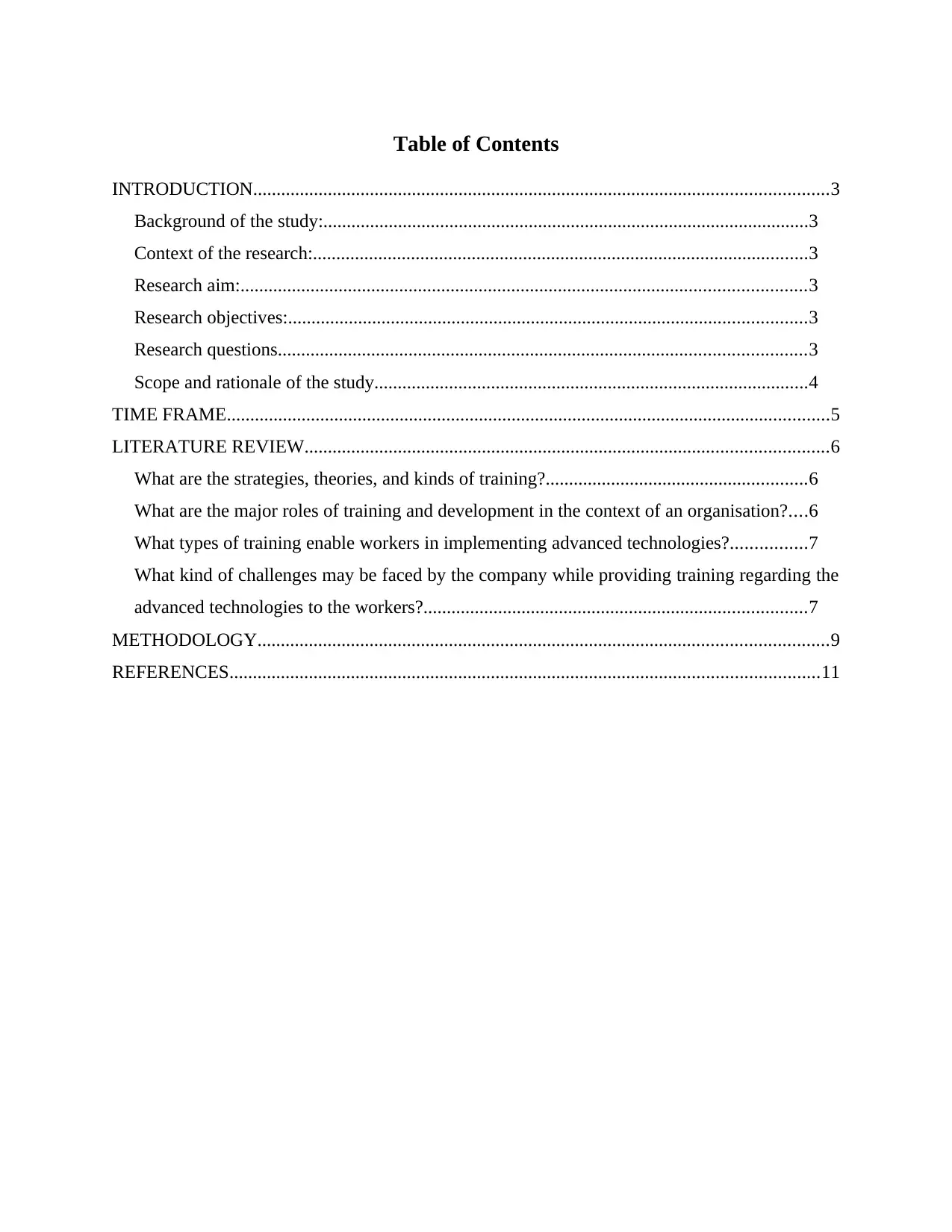
Table of Contents
INTRODUCTION...........................................................................................................................3
Background of the study:........................................................................................................3
Context of the research:..........................................................................................................3
Research aim:.........................................................................................................................3
Research objectives:...............................................................................................................3
Research questions.................................................................................................................3
Scope and rationale of the study.............................................................................................4
TIME FRAME.................................................................................................................................5
LITERATURE REVIEW................................................................................................................6
What are the strategies, theories, and kinds of training?........................................................6
What are the major roles of training and development in the context of an organisation?....6
What types of training enable workers in implementing advanced technologies?................7
What kind of challenges may be faced by the company while providing training regarding the
advanced technologies to the workers?..................................................................................7
METHODOLOGY..........................................................................................................................9
REFERENCES..............................................................................................................................11
INTRODUCTION...........................................................................................................................3
Background of the study:........................................................................................................3
Context of the research:..........................................................................................................3
Research aim:.........................................................................................................................3
Research objectives:...............................................................................................................3
Research questions.................................................................................................................3
Scope and rationale of the study.............................................................................................4
TIME FRAME.................................................................................................................................5
LITERATURE REVIEW................................................................................................................6
What are the strategies, theories, and kinds of training?........................................................6
What are the major roles of training and development in the context of an organisation?....6
What types of training enable workers in implementing advanced technologies?................7
What kind of challenges may be faced by the company while providing training regarding the
advanced technologies to the workers?..................................................................................7
METHODOLOGY..........................................................................................................................9
REFERENCES..............................................................................................................................11
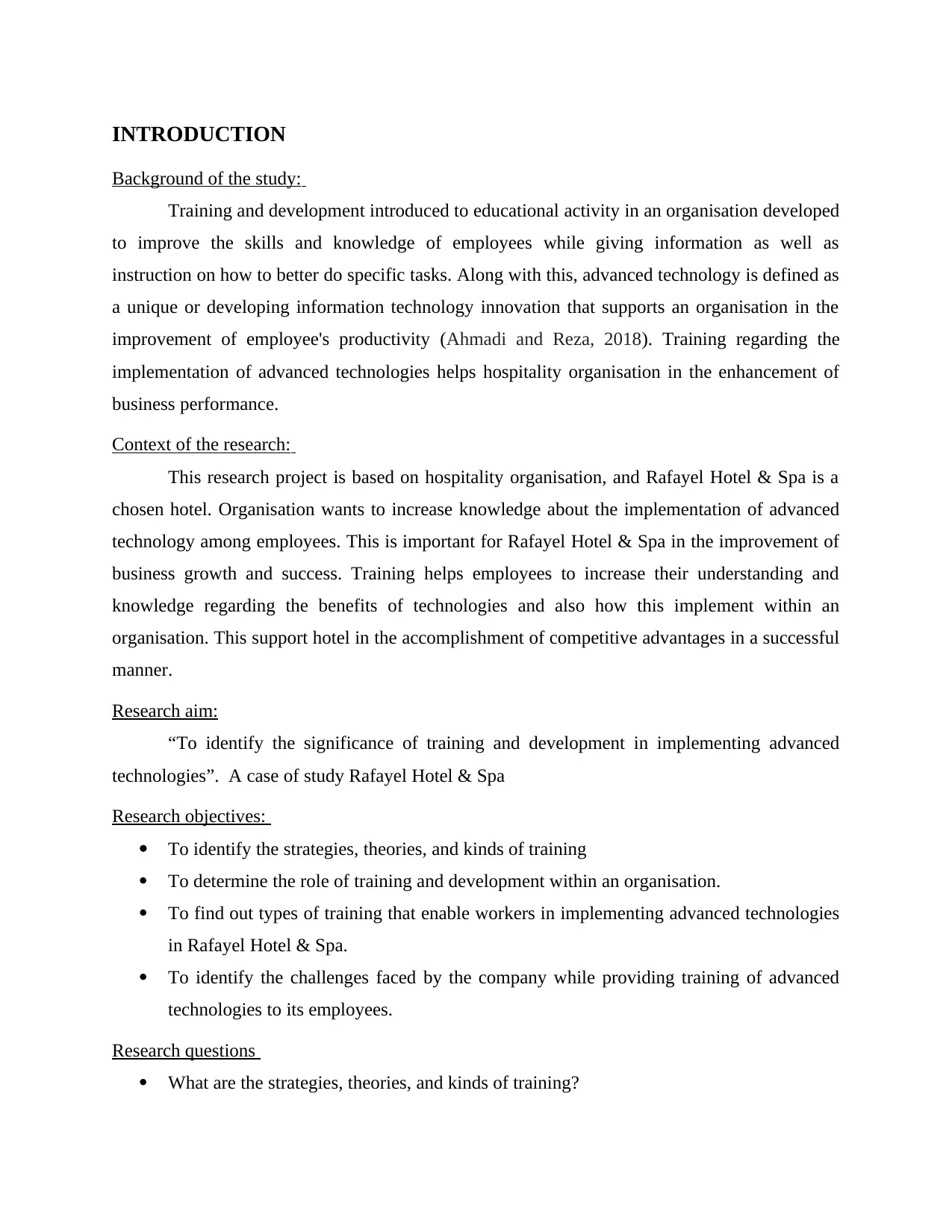
INTRODUCTION
Background of the study:
Training and development introduced to educational activity in an organisation developed
to improve the skills and knowledge of employees while giving information as well as
instruction on how to better do specific tasks. Along with this, advanced technology is defined as
a unique or developing information technology innovation that supports an organisation in the
improvement of employee's productivity (Ahmadi and Reza, 2018). Training regarding the
implementation of advanced technologies helps hospitality organisation in the enhancement of
business performance.
Context of the research:
This research project is based on hospitality organisation, and Rafayel Hotel & Spa is a
chosen hotel. Organisation wants to increase knowledge about the implementation of advanced
technology among employees. This is important for Rafayel Hotel & Spa in the improvement of
business growth and success. Training helps employees to increase their understanding and
knowledge regarding the benefits of technologies and also how this implement within an
organisation. This support hotel in the accomplishment of competitive advantages in a successful
manner.
Research aim:
“To identify the significance of training and development in implementing advanced
technologies”. A case of study Rafayel Hotel & Spa
Research objectives:
To identify the strategies, theories, and kinds of training
To determine the role of training and development within an organisation.
To find out types of training that enable workers in implementing advanced technologies
in Rafayel Hotel & Spa.
To identify the challenges faced by the company while providing training of advanced
technologies to its employees.
Research questions
What are the strategies, theories, and kinds of training?
Background of the study:
Training and development introduced to educational activity in an organisation developed
to improve the skills and knowledge of employees while giving information as well as
instruction on how to better do specific tasks. Along with this, advanced technology is defined as
a unique or developing information technology innovation that supports an organisation in the
improvement of employee's productivity (Ahmadi and Reza, 2018). Training regarding the
implementation of advanced technologies helps hospitality organisation in the enhancement of
business performance.
Context of the research:
This research project is based on hospitality organisation, and Rafayel Hotel & Spa is a
chosen hotel. Organisation wants to increase knowledge about the implementation of advanced
technology among employees. This is important for Rafayel Hotel & Spa in the improvement of
business growth and success. Training helps employees to increase their understanding and
knowledge regarding the benefits of technologies and also how this implement within an
organisation. This support hotel in the accomplishment of competitive advantages in a successful
manner.
Research aim:
“To identify the significance of training and development in implementing advanced
technologies”. A case of study Rafayel Hotel & Spa
Research objectives:
To identify the strategies, theories, and kinds of training
To determine the role of training and development within an organisation.
To find out types of training that enable workers in implementing advanced technologies
in Rafayel Hotel & Spa.
To identify the challenges faced by the company while providing training of advanced
technologies to its employees.
Research questions
What are the strategies, theories, and kinds of training?
⊘ This is a preview!⊘
Do you want full access?
Subscribe today to unlock all pages.

Trusted by 1+ million students worldwide
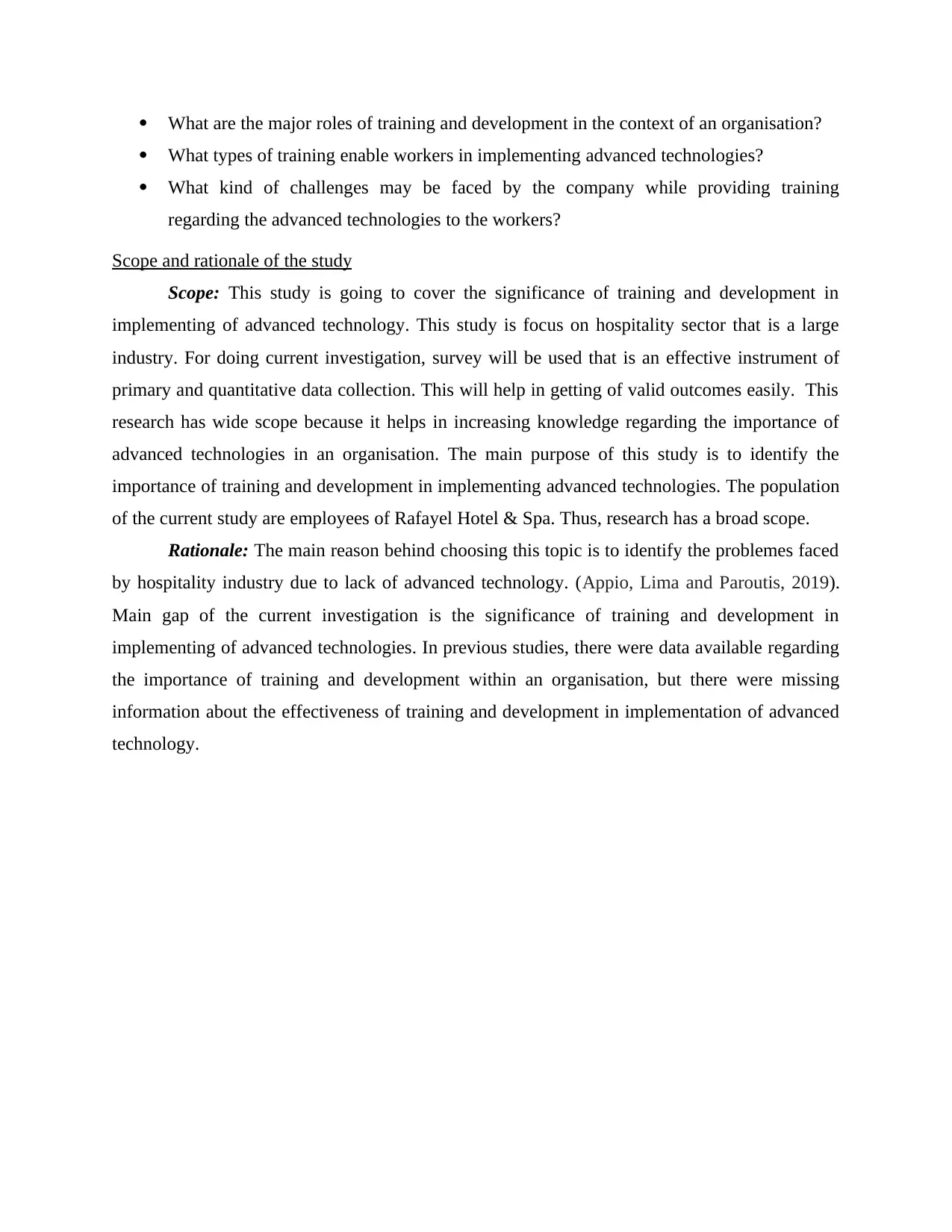
What are the major roles of training and development in the context of an organisation?
What types of training enable workers in implementing advanced technologies?
What kind of challenges may be faced by the company while providing training
regarding the advanced technologies to the workers?
Scope and rationale of the study
Scope: This study is going to cover the significance of training and development in
implementing of advanced technology. This study is focus on hospitality sector that is a large
industry. For doing current investigation, survey will be used that is an effective instrument of
primary and quantitative data collection. This will help in getting of valid outcomes easily. This
research has wide scope because it helps in increasing knowledge regarding the importance of
advanced technologies in an organisation. The main purpose of this study is to identify the
importance of training and development in implementing advanced technologies. The population
of the current study are employees of Rafayel Hotel & Spa. Thus, research has a broad scope.
Rationale: The main reason behind choosing this topic is to identify the problemes faced
by hospitality industry due to lack of advanced technology. (Appio, Lima and Paroutis, 2019).
Main gap of the current investigation is the significance of training and development in
implementing of advanced technologies. In previous studies, there were data available regarding
the importance of training and development within an organisation, but there were missing
information about the effectiveness of training and development in implementation of advanced
technology.
What types of training enable workers in implementing advanced technologies?
What kind of challenges may be faced by the company while providing training
regarding the advanced technologies to the workers?
Scope and rationale of the study
Scope: This study is going to cover the significance of training and development in
implementing of advanced technology. This study is focus on hospitality sector that is a large
industry. For doing current investigation, survey will be used that is an effective instrument of
primary and quantitative data collection. This will help in getting of valid outcomes easily. This
research has wide scope because it helps in increasing knowledge regarding the importance of
advanced technologies in an organisation. The main purpose of this study is to identify the
importance of training and development in implementing advanced technologies. The population
of the current study are employees of Rafayel Hotel & Spa. Thus, research has a broad scope.
Rationale: The main reason behind choosing this topic is to identify the problemes faced
by hospitality industry due to lack of advanced technology. (Appio, Lima and Paroutis, 2019).
Main gap of the current investigation is the significance of training and development in
implementing of advanced technologies. In previous studies, there were data available regarding
the importance of training and development within an organisation, but there were missing
information about the effectiveness of training and development in implementation of advanced
technology.
Paraphrase This Document
Need a fresh take? Get an instant paraphrase of this document with our AI Paraphraser
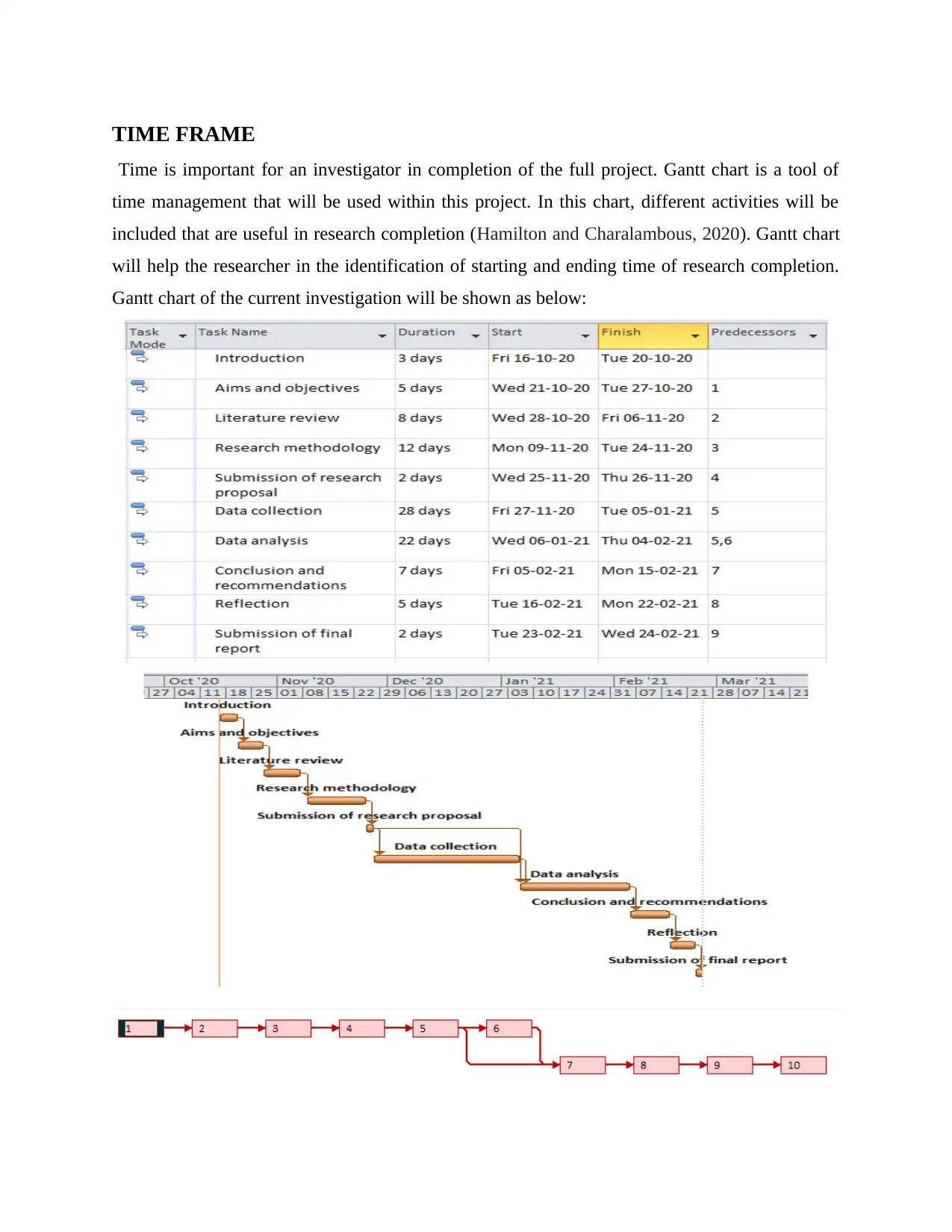
TIME FRAME
Time is important for an investigator in completion of the full project. Gantt chart is a tool of
time management that will be used within this project. In this chart, different activities will be
included that are useful in research completion (Hamilton and Charalambous, 2020). Gantt chart
will help the researcher in the identification of starting and ending time of research completion.
Gantt chart of the current investigation will be shown as below:
Time is important for an investigator in completion of the full project. Gantt chart is a tool of
time management that will be used within this project. In this chart, different activities will be
included that are useful in research completion (Hamilton and Charalambous, 2020). Gantt chart
will help the researcher in the identification of starting and ending time of research completion.
Gantt chart of the current investigation will be shown as below:
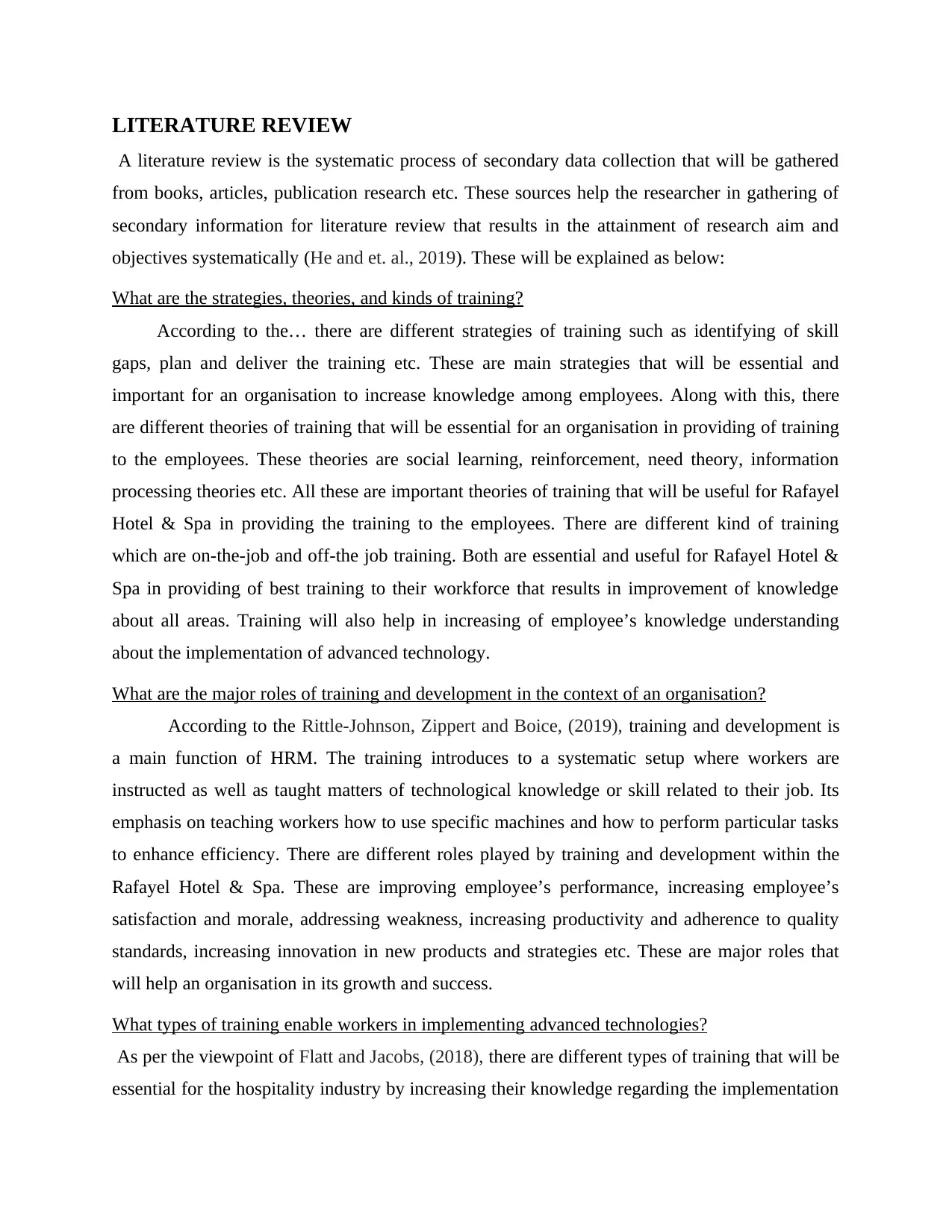
LITERATURE REVIEW
A literature review is the systematic process of secondary data collection that will be gathered
from books, articles, publication research etc. These sources help the researcher in gathering of
secondary information for literature review that results in the attainment of research aim and
objectives systematically (He and et. al., 2019). These will be explained as below:
What are the strategies, theories, and kinds of training?
According to the… there are different strategies of training such as identifying of skill
gaps, plan and deliver the training etc. These are main strategies that will be essential and
important for an organisation to increase knowledge among employees. Along with this, there
are different theories of training that will be essential for an organisation in providing of training
to the employees. These theories are social learning, reinforcement, need theory, information
processing theories etc. All these are important theories of training that will be useful for Rafayel
Hotel & Spa in providing the training to the employees. There are different kind of training
which are on-the-job and off-the job training. Both are essential and useful for Rafayel Hotel &
Spa in providing of best training to their workforce that results in improvement of knowledge
about all areas. Training will also help in increasing of employee’s knowledge understanding
about the implementation of advanced technology.
What are the major roles of training and development in the context of an organisation?
According to the Rittle-Johnson, Zippert and Boice, (2019), training and development is
a main function of HRM. The training introduces to a systematic setup where workers are
instructed as well as taught matters of technological knowledge or skill related to their job. Its
emphasis on teaching workers how to use specific machines and how to perform particular tasks
to enhance efficiency. There are different roles played by training and development within the
Rafayel Hotel & Spa. These are improving employee’s performance, increasing employee’s
satisfaction and morale, addressing weakness, increasing productivity and adherence to quality
standards, increasing innovation in new products and strategies etc. These are major roles that
will help an organisation in its growth and success.
What types of training enable workers in implementing advanced technologies?
As per the viewpoint of Flatt and Jacobs, (2018), there are different types of training that will be
essential for the hospitality industry by increasing their knowledge regarding the implementation
A literature review is the systematic process of secondary data collection that will be gathered
from books, articles, publication research etc. These sources help the researcher in gathering of
secondary information for literature review that results in the attainment of research aim and
objectives systematically (He and et. al., 2019). These will be explained as below:
What are the strategies, theories, and kinds of training?
According to the… there are different strategies of training such as identifying of skill
gaps, plan and deliver the training etc. These are main strategies that will be essential and
important for an organisation to increase knowledge among employees. Along with this, there
are different theories of training that will be essential for an organisation in providing of training
to the employees. These theories are social learning, reinforcement, need theory, information
processing theories etc. All these are important theories of training that will be useful for Rafayel
Hotel & Spa in providing the training to the employees. There are different kind of training
which are on-the-job and off-the job training. Both are essential and useful for Rafayel Hotel &
Spa in providing of best training to their workforce that results in improvement of knowledge
about all areas. Training will also help in increasing of employee’s knowledge understanding
about the implementation of advanced technology.
What are the major roles of training and development in the context of an organisation?
According to the Rittle-Johnson, Zippert and Boice, (2019), training and development is
a main function of HRM. The training introduces to a systematic setup where workers are
instructed as well as taught matters of technological knowledge or skill related to their job. Its
emphasis on teaching workers how to use specific machines and how to perform particular tasks
to enhance efficiency. There are different roles played by training and development within the
Rafayel Hotel & Spa. These are improving employee’s performance, increasing employee’s
satisfaction and morale, addressing weakness, increasing productivity and adherence to quality
standards, increasing innovation in new products and strategies etc. These are major roles that
will help an organisation in its growth and success.
What types of training enable workers in implementing advanced technologies?
As per the viewpoint of Flatt and Jacobs, (2018), there are different types of training that will be
essential for the hospitality industry by increasing their knowledge regarding the implementation
⊘ This is a preview!⊘
Do you want full access?
Subscribe today to unlock all pages.

Trusted by 1+ million students worldwide
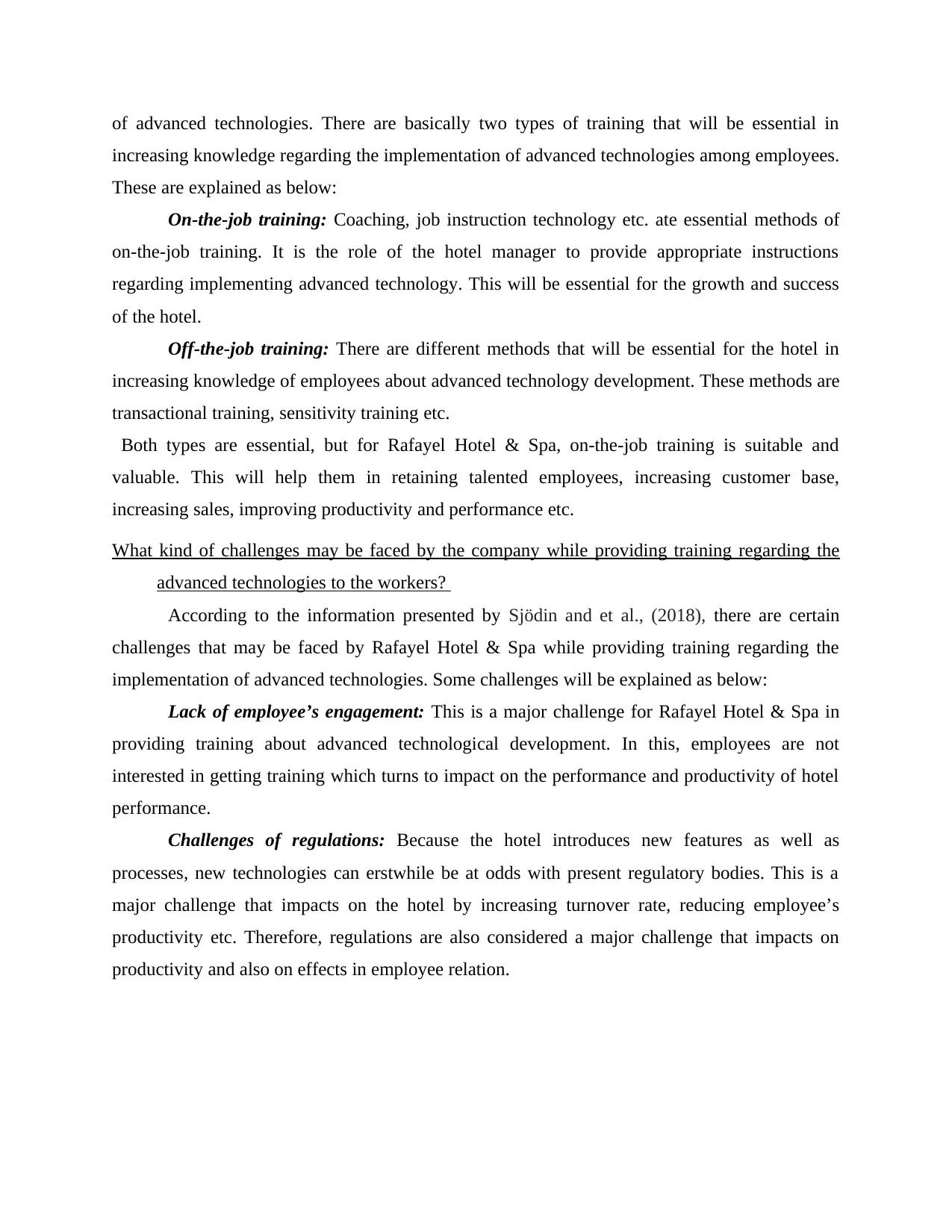
of advanced technologies. There are basically two types of training that will be essential in
increasing knowledge regarding the implementation of advanced technologies among employees.
These are explained as below:
On-the-job training: Coaching, job instruction technology etc. ate essential methods of
on-the-job training. It is the role of the hotel manager to provide appropriate instructions
regarding implementing advanced technology. This will be essential for the growth and success
of the hotel.
Off-the-job training: There are different methods that will be essential for the hotel in
increasing knowledge of employees about advanced technology development. These methods are
transactional training, sensitivity training etc.
Both types are essential, but for Rafayel Hotel & Spa, on-the-job training is suitable and
valuable. This will help them in retaining talented employees, increasing customer base,
increasing sales, improving productivity and performance etc.
What kind of challenges may be faced by the company while providing training regarding the
advanced technologies to the workers?
According to the information presented by Sjödin and et al., (2018), there are certain
challenges that may be faced by Rafayel Hotel & Spa while providing training regarding the
implementation of advanced technologies. Some challenges will be explained as below:
Lack of employee’s engagement: This is a major challenge for Rafayel Hotel & Spa in
providing training about advanced technological development. In this, employees are not
interested in getting training which turns to impact on the performance and productivity of hotel
performance.
Challenges of regulations: Because the hotel introduces new features as well as
processes, new technologies can erstwhile be at odds with present regulatory bodies. This is a
major challenge that impacts on the hotel by increasing turnover rate, reducing employee’s
productivity etc. Therefore, regulations are also considered a major challenge that impacts on
productivity and also on effects in employee relation.
increasing knowledge regarding the implementation of advanced technologies among employees.
These are explained as below:
On-the-job training: Coaching, job instruction technology etc. ate essential methods of
on-the-job training. It is the role of the hotel manager to provide appropriate instructions
regarding implementing advanced technology. This will be essential for the growth and success
of the hotel.
Off-the-job training: There are different methods that will be essential for the hotel in
increasing knowledge of employees about advanced technology development. These methods are
transactional training, sensitivity training etc.
Both types are essential, but for Rafayel Hotel & Spa, on-the-job training is suitable and
valuable. This will help them in retaining talented employees, increasing customer base,
increasing sales, improving productivity and performance etc.
What kind of challenges may be faced by the company while providing training regarding the
advanced technologies to the workers?
According to the information presented by Sjödin and et al., (2018), there are certain
challenges that may be faced by Rafayel Hotel & Spa while providing training regarding the
implementation of advanced technologies. Some challenges will be explained as below:
Lack of employee’s engagement: This is a major challenge for Rafayel Hotel & Spa in
providing training about advanced technological development. In this, employees are not
interested in getting training which turns to impact on the performance and productivity of hotel
performance.
Challenges of regulations: Because the hotel introduces new features as well as
processes, new technologies can erstwhile be at odds with present regulatory bodies. This is a
major challenge that impacts on the hotel by increasing turnover rate, reducing employee’s
productivity etc. Therefore, regulations are also considered a major challenge that impacts on
productivity and also on effects in employee relation.
Paraphrase This Document
Need a fresh take? Get an instant paraphrase of this document with our AI Paraphraser
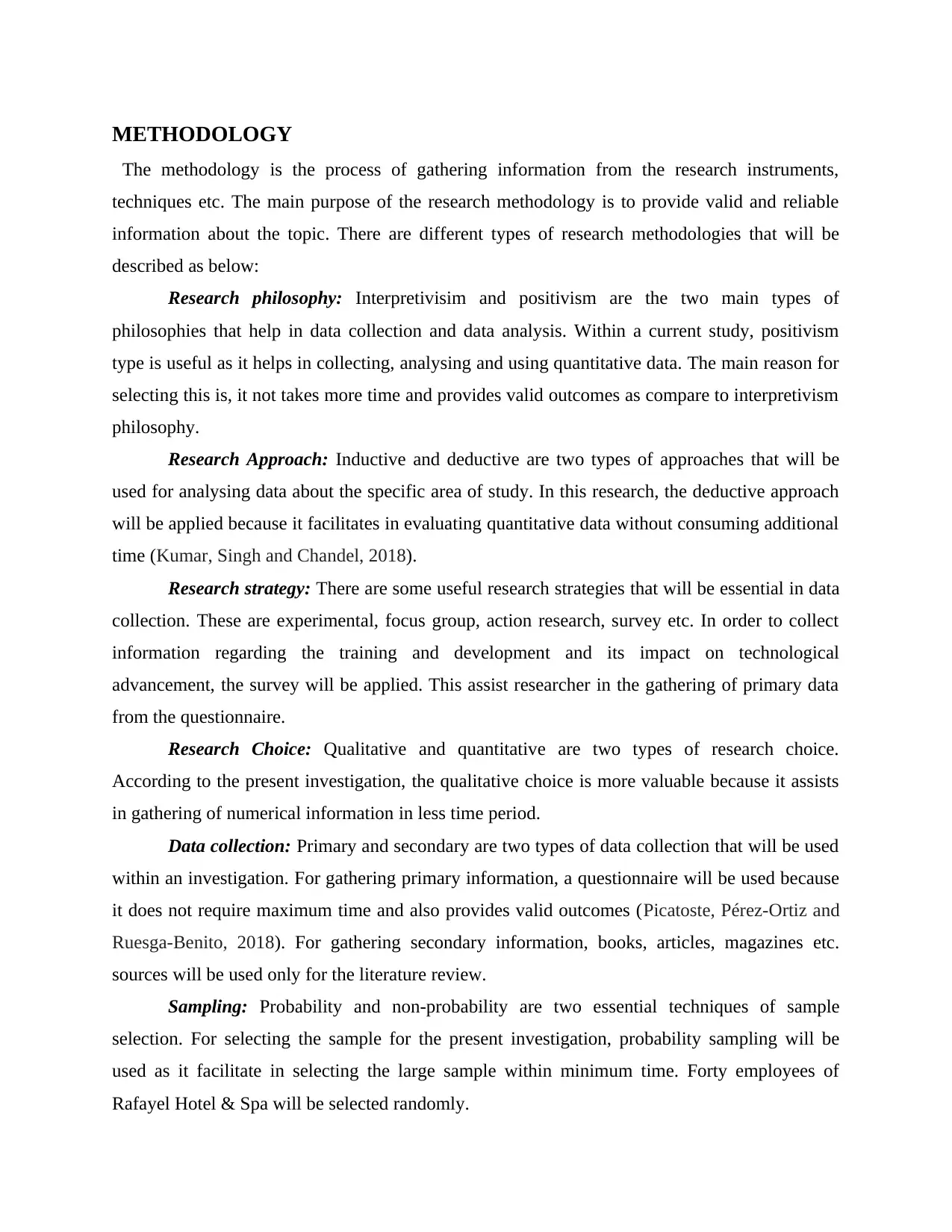
METHODOLOGY
The methodology is the process of gathering information from the research instruments,
techniques etc. The main purpose of the research methodology is to provide valid and reliable
information about the topic. There are different types of research methodologies that will be
described as below:
Research philosophy: Interpretivisim and positivism are the two main types of
philosophies that help in data collection and data analysis. Within a current study, positivism
type is useful as it helps in collecting, analysing and using quantitative data. The main reason for
selecting this is, it not takes more time and provides valid outcomes as compare to interpretivism
philosophy.
Research Approach: Inductive and deductive are two types of approaches that will be
used for analysing data about the specific area of study. In this research, the deductive approach
will be applied because it facilitates in evaluating quantitative data without consuming additional
time (Kumar, Singh and Chandel, 2018).
Research strategy: There are some useful research strategies that will be essential in data
collection. These are experimental, focus group, action research, survey etc. In order to collect
information regarding the training and development and its impact on technological
advancement, the survey will be applied. This assist researcher in the gathering of primary data
from the questionnaire.
Research Choice: Qualitative and quantitative are two types of research choice.
According to the present investigation, the qualitative choice is more valuable because it assists
in gathering of numerical information in less time period.
Data collection: Primary and secondary are two types of data collection that will be used
within an investigation. For gathering primary information, a questionnaire will be used because
it does not require maximum time and also provides valid outcomes (Picatoste, Pérez-Ortiz and
Ruesga-Benito, 2018). For gathering secondary information, books, articles, magazines etc.
sources will be used only for the literature review.
Sampling: Probability and non-probability are two essential techniques of sample
selection. For selecting the sample for the present investigation, probability sampling will be
used as it facilitate in selecting the large sample within minimum time. Forty employees of
Rafayel Hotel & Spa will be selected randomly.
The methodology is the process of gathering information from the research instruments,
techniques etc. The main purpose of the research methodology is to provide valid and reliable
information about the topic. There are different types of research methodologies that will be
described as below:
Research philosophy: Interpretivisim and positivism are the two main types of
philosophies that help in data collection and data analysis. Within a current study, positivism
type is useful as it helps in collecting, analysing and using quantitative data. The main reason for
selecting this is, it not takes more time and provides valid outcomes as compare to interpretivism
philosophy.
Research Approach: Inductive and deductive are two types of approaches that will be
used for analysing data about the specific area of study. In this research, the deductive approach
will be applied because it facilitates in evaluating quantitative data without consuming additional
time (Kumar, Singh and Chandel, 2018).
Research strategy: There are some useful research strategies that will be essential in data
collection. These are experimental, focus group, action research, survey etc. In order to collect
information regarding the training and development and its impact on technological
advancement, the survey will be applied. This assist researcher in the gathering of primary data
from the questionnaire.
Research Choice: Qualitative and quantitative are two types of research choice.
According to the present investigation, the qualitative choice is more valuable because it assists
in gathering of numerical information in less time period.
Data collection: Primary and secondary are two types of data collection that will be used
within an investigation. For gathering primary information, a questionnaire will be used because
it does not require maximum time and also provides valid outcomes (Picatoste, Pérez-Ortiz and
Ruesga-Benito, 2018). For gathering secondary information, books, articles, magazines etc.
sources will be used only for the literature review.
Sampling: Probability and non-probability are two essential techniques of sample
selection. For selecting the sample for the present investigation, probability sampling will be
used as it facilitate in selecting the large sample within minimum time. Forty employees of
Rafayel Hotel & Spa will be selected randomly.

Research ethics: There are various principles of research ethics that should be applied by
the researcher in the current study. These principles are obtained informed consent, avoid
deceptive practices, anonymity and confidentiality etc. By following these, the researcher can
complete entire activities of the research in an ethical manner (Scherer and et. al., 2018).
Data analysis: In order to analyse quantitative information collected from the
questionnaire, frequency distribution analysis as an analytical technique will be used. This will
help investigator in analysing of quantitative data within less time period and in a systematic
manner. Ms-Excel will also be used for making graphs according to the research questions. This
facilitates researched in presenting information in a graphical manner (Sepasgozar and et. al.,
2019).
the researcher in the current study. These principles are obtained informed consent, avoid
deceptive practices, anonymity and confidentiality etc. By following these, the researcher can
complete entire activities of the research in an ethical manner (Scherer and et. al., 2018).
Data analysis: In order to analyse quantitative information collected from the
questionnaire, frequency distribution analysis as an analytical technique will be used. This will
help investigator in analysing of quantitative data within less time period and in a systematic
manner. Ms-Excel will also be used for making graphs according to the research questions. This
facilitates researched in presenting information in a graphical manner (Sepasgozar and et. al.,
2019).
⊘ This is a preview!⊘
Do you want full access?
Subscribe today to unlock all pages.

Trusted by 1+ million students worldwide
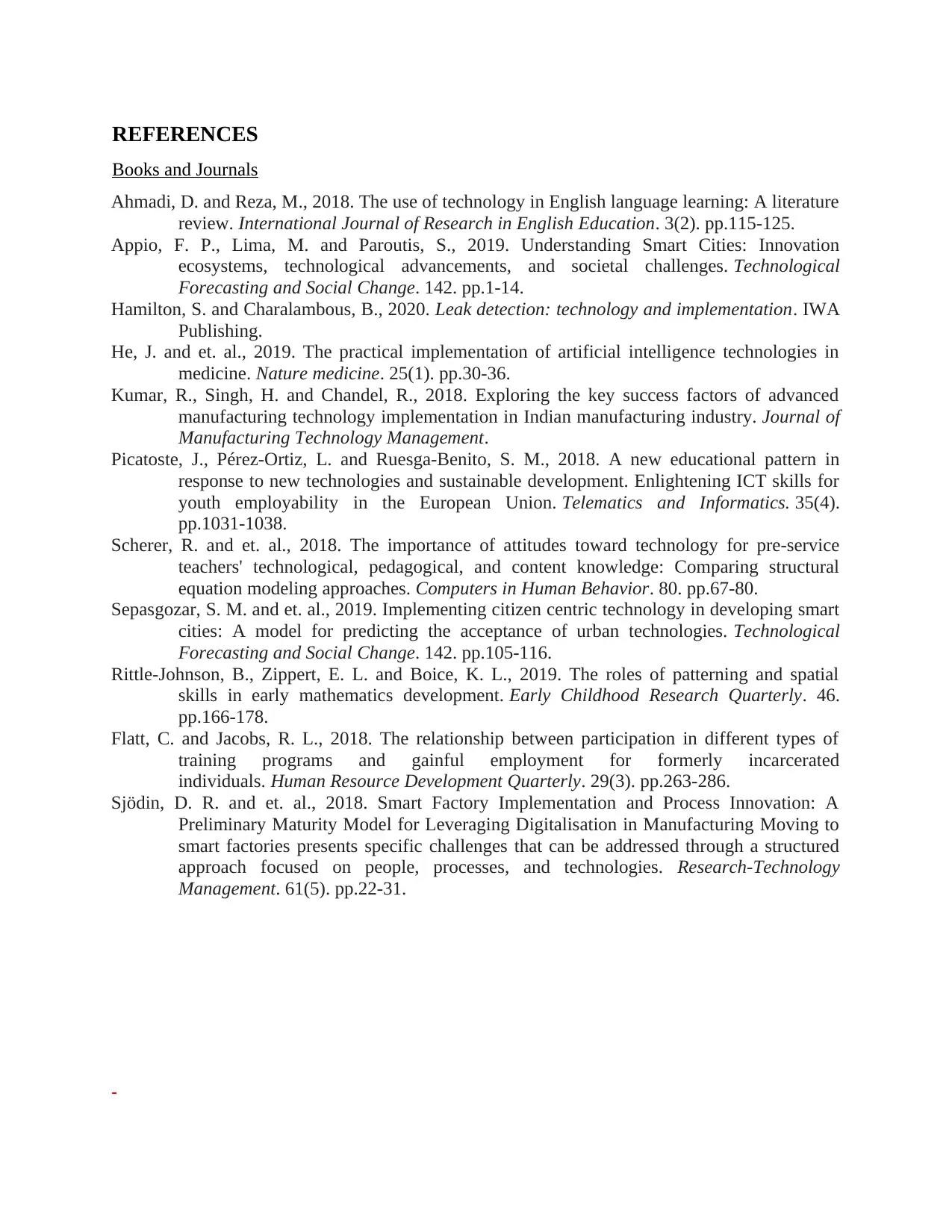
REFERENCES
Books and Journals
Ahmadi, D. and Reza, M., 2018. The use of technology in English language learning: A literature
review. International Journal of Research in English Education. 3(2). pp.115-125.
Appio, F. P., Lima, M. and Paroutis, S., 2019. Understanding Smart Cities: Innovation
ecosystems, technological advancements, and societal challenges. Technological
Forecasting and Social Change. 142. pp.1-14.
Hamilton, S. and Charalambous, B., 2020. Leak detection: technology and implementation. IWA
Publishing.
He, J. and et. al., 2019. The practical implementation of artificial intelligence technologies in
medicine. Nature medicine. 25(1). pp.30-36.
Kumar, R., Singh, H. and Chandel, R., 2018. Exploring the key success factors of advanced
manufacturing technology implementation in Indian manufacturing industry. Journal of
Manufacturing Technology Management.
Picatoste, J., Pérez-Ortiz, L. and Ruesga-Benito, S. M., 2018. A new educational pattern in
response to new technologies and sustainable development. Enlightening ICT skills for
youth employability in the European Union. Telematics and Informatics. 35(4).
pp.1031-1038.
Scherer, R. and et. al., 2018. The importance of attitudes toward technology for pre-service
teachers' technological, pedagogical, and content knowledge: Comparing structural
equation modeling approaches. Computers in Human Behavior. 80. pp.67-80.
Sepasgozar, S. M. and et. al., 2019. Implementing citizen centric technology in developing smart
cities: A model for predicting the acceptance of urban technologies. Technological
Forecasting and Social Change. 142. pp.105-116.
Rittle-Johnson, B., Zippert, E. L. and Boice, K. L., 2019. The roles of patterning and spatial
skills in early mathematics development. Early Childhood Research Quarterly. 46.
pp.166-178.
Flatt, C. and Jacobs, R. L., 2018. The relationship between participation in different types of
training programs and gainful employment for formerly incarcerated
individuals. Human Resource Development Quarterly. 29(3). pp.263-286.
Sjödin, D. R. and et. al., 2018. Smart Factory Implementation and Process Innovation: A
Preliminary Maturity Model for Leveraging Digitalisation in Manufacturing Moving to
smart factories presents specific challenges that can be addressed through a structured
approach focused on people, processes, and technologies. Research-Technology
Management. 61(5). pp.22-31.
Books and Journals
Ahmadi, D. and Reza, M., 2018. The use of technology in English language learning: A literature
review. International Journal of Research in English Education. 3(2). pp.115-125.
Appio, F. P., Lima, M. and Paroutis, S., 2019. Understanding Smart Cities: Innovation
ecosystems, technological advancements, and societal challenges. Technological
Forecasting and Social Change. 142. pp.1-14.
Hamilton, S. and Charalambous, B., 2020. Leak detection: technology and implementation. IWA
Publishing.
He, J. and et. al., 2019. The practical implementation of artificial intelligence technologies in
medicine. Nature medicine. 25(1). pp.30-36.
Kumar, R., Singh, H. and Chandel, R., 2018. Exploring the key success factors of advanced
manufacturing technology implementation in Indian manufacturing industry. Journal of
Manufacturing Technology Management.
Picatoste, J., Pérez-Ortiz, L. and Ruesga-Benito, S. M., 2018. A new educational pattern in
response to new technologies and sustainable development. Enlightening ICT skills for
youth employability in the European Union. Telematics and Informatics. 35(4).
pp.1031-1038.
Scherer, R. and et. al., 2018. The importance of attitudes toward technology for pre-service
teachers' technological, pedagogical, and content knowledge: Comparing structural
equation modeling approaches. Computers in Human Behavior. 80. pp.67-80.
Sepasgozar, S. M. and et. al., 2019. Implementing citizen centric technology in developing smart
cities: A model for predicting the acceptance of urban technologies. Technological
Forecasting and Social Change. 142. pp.105-116.
Rittle-Johnson, B., Zippert, E. L. and Boice, K. L., 2019. The roles of patterning and spatial
skills in early mathematics development. Early Childhood Research Quarterly. 46.
pp.166-178.
Flatt, C. and Jacobs, R. L., 2018. The relationship between participation in different types of
training programs and gainful employment for formerly incarcerated
individuals. Human Resource Development Quarterly. 29(3). pp.263-286.
Sjödin, D. R. and et. al., 2018. Smart Factory Implementation and Process Innovation: A
Preliminary Maturity Model for Leveraging Digitalisation in Manufacturing Moving to
smart factories presents specific challenges that can be addressed through a structured
approach focused on people, processes, and technologies. Research-Technology
Management. 61(5). pp.22-31.
Paraphrase This Document
Need a fresh take? Get an instant paraphrase of this document with our AI Paraphraser

1 out of 11
Related Documents
Your All-in-One AI-Powered Toolkit for Academic Success.
+13062052269
info@desklib.com
Available 24*7 on WhatsApp / Email
![[object Object]](/_next/static/media/star-bottom.7253800d.svg)
Unlock your academic potential
Copyright © 2020–2025 A2Z Services. All Rights Reserved. Developed and managed by ZUCOL.





